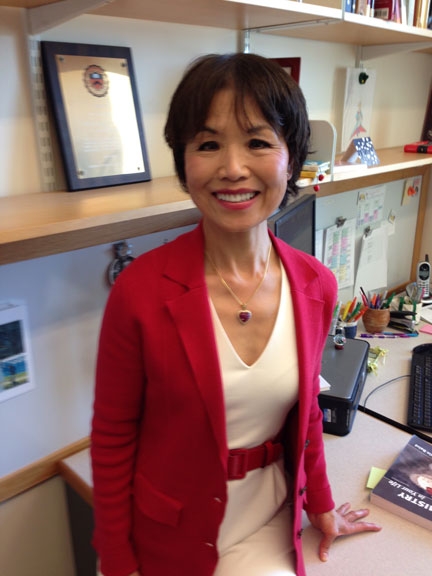Sunhee Choi
Retired John D. McCullough Professor of Chemistry

- choi@middlebury.edu
Professor Sunhee Choi joined the chemistry faculty at Middlebury College in 1987. She earned her B.S. in Chemistry at Seoul National University and Ph.D. in Physical Chemistry at Princeton University. Prior to her arrival at Middlebury, she worked at Colgate-Palmolive Company as a research chemist. For chemistry and biochemistry majors, she teaches general chemistry, physical chemistry, and instrumentation analysis and physical-inorganic laboratory courses. She has taught several nonmajors courses entitled “Food chemistry”, “Biographies of the Imaginative”, “Art and Chemistry”, “Color in Science and Culture”, “The Many Faces in Science”, and “World of Chemistry”.
Professor Choi maintains active research program involving undergraduates. They published 11 manuscripts in top chemical journals in the area of the mechanism of platinum (PtIV) and ruthenium (RuIII) anticancer drugs. The work was supported by external-funds including NIH/AREA, and NSF/RUI (total ~$839,000).
The current research interest of Choi lab lies in the area of Alzheimer’s disease (AD). We are searching for the cause of Alzheimer’s disease (AD) at the molecular level. Uncovering the mechanism of AD is crucial towards developing an effective treatment for AD. Because the brain of AD patients contains aggregated amyloid-β (Aβ) and transition metal ions localized in plaques, current effort in developing AD drug is to remove aggregated Aβ and/or transition metal ions (copper, iron, and zinc). However, recent (spring, 2017) failure of Lilly’s AD drug targeting removal of aggregated amyloid-β (Aβ) suggests there may be another mechanism to cause AD. Since most of these Aβ plaques contain Advanced Glycation End products (AGEs), we hypothesize that reactions of amino acids in Aβ and sugars (glycation) play important role in causing AD. Our research will give valuable insights into the mechanism of AD at the molecular level. We use UV/vis Spectroscopy, Ultra Performance Liquid Chromatography-Electron Spray Ionization- Quadruple Time-of-Flight-Mass Spectroscopy, Circular Dichroism Spectroscopy, and Gel Electrophoresis.
Professor Choi’s teaching efforts are described in the Middlebury alumni magazine (1999) and Middlebury Students newspapers in 2004. In 2005, the Carnegie Foundation named Professor Choi the Vermont Professor of the Year in recognition of her dedication to undergraduate research.
Publications
* Middlebury College student authors are underlined.
Fica-Contreras, S. M.; Shuster, S. O.; Durfee, N. D.; Bowe, G. J. K.; Henning, N. J.; Hill, S. A.; Vrla, G. D.; Stillman, D. R.; Suralik, K. M.; Sandwick, R. K.; Choi, S. “Glycation of Lys-16 and Arg-5 in amyloid-b and the presence of Cu2+ play a major role in the oxidative stress mechanism of Alzheimer’s disease” J. Biol. Inorg. Chem. 2017, 22, 1211-1222. DOI: 10.1007/s00775-017-1497-5
Kipouros, I.; Fica-Contreras, S. M.; Bowe, G. J. K.;·Choi, S. “Oxidation of 5’-dGMP, 5’-dGDP, and 5’-dGTP by a Platinum(IV) Complex” J. Biol. Inorg. Chem. 2015, 20, 1327-1341. DOI: 10.1007/s00775-015-1312-0
Wolf, M. W.; Choi, S. “Disproportionation of Pentaammineruthenium(III)-Nucleoside Complexes Leads to Two-Electron Oxidation of Nucleosides without Involving Oxygen Molecules” J. Biol. Inorg. Chem. 2012,17, 1283-1291, DOI 10.1007/s00775-012-0942-8.
Choi, S.; Ryu, DW; DellaRocca, JG; Wolf, M. W.; Bogart, J. A. “Two Electron Oxidation of Deoxyguanosine by a Ru(III) Complex without Involving Oxygen Molecules through Disproportionation” Inorg. Chem. 2011, 50, 6567-6574.
Choi, S.; Personick M. L.; Bogart, J. A.; Ryu, DW; Redman, R. M.; Laryea-Walker, E. ” Oxidation of a Guanine Derivative Coordinated to a Pt(IV) Complex Initiated by Intermolecular Nucleophilic Attacks” Dalton Trans. 2011, 40, 2888-2897.
Choi, S.; Vastag, L.; Larrabee, Y. C.; Personick, M. L.; Schaberg, K. B.; Fowler, B. J.; Sandwick, R. K.; Rawji, G. “The Importance of Pt(II) Catalyzed Pt(IV) Substitution for the Oxidation of Guanosine Derivatives by Pt(IV) Complexes” Inorg. Chem., 2008, 47, 1352-1360. Correction: Inorg. Chem., 2008, 47, 3920-3920.
Choi, S.; Vastag, L.; Leung, C. H.; Beard, A. M.; Knowles, D. E., Larrabee, J. A. “Kinetics and Mechanism of Oxidation of Guanosine Derivatives by Platinum(IV) Complexes” Inorg. Chem., 2006, 45, 10108-10114.
Choi, S.; Cooley, R. B.; Voutchkova, A.; Leung, C. H.; Vastag, L.; Knowles, D. E. “Oxidation of Guanosine Derivatives by a Platinum(IV) Complex: Internal Electron Transfer through Cyclization” J. Am. Chem. Soc., 2005, 127, 1773-1781.
Choi, S.; Cooley, R. B.; Hakemian, A. S.; Larrabee, Y. C.; Bunt, R. C.; Maupaus, S. D.; Muller, J. G.; Burrows, C. J. “Mechanism of Two-Electron Oxidation of Deoxyguanosine-5’-Monophosphate by a Platinum(IV) Complex” J. Am. Chem. Soc., 2004, 126, 591-598.
Choi, S.; Delaney, S.; Orbai, L.; Padgett, E. J.; Hakemian, A. S. “A Platinum(IV) Complex Oxidizes Guanine to 8-Oxo-Guanine in DNA and RNA” Inorg. Chem., 2001, 40, 5481-5482.
Choi, S.; Mahalingaiah, S.; Delaney, S.; Neale, N. R.; Masood, S. “Substitution and Reduction of Platinum(IV) Complexes by a Nucleotide, Guanosine 5’-Monophosphate (5’-GMP)” Inorg. Chem., 1999, 38, 1800-1805.
Choi, S.; Filotto,C.; Bisanzo, M.; Delaney, S.; Lagasee, D.; Whitworth, J. L.; Jusko, A.; Li, C.; Wood, N. A.; Willingham, J.; Schwenker, A.; Spaulding, K. “Reduction and Anticancer Activity of Platinum(IV) Complexes” Inorg. Chem., 1998, 37, 2500-2504.
